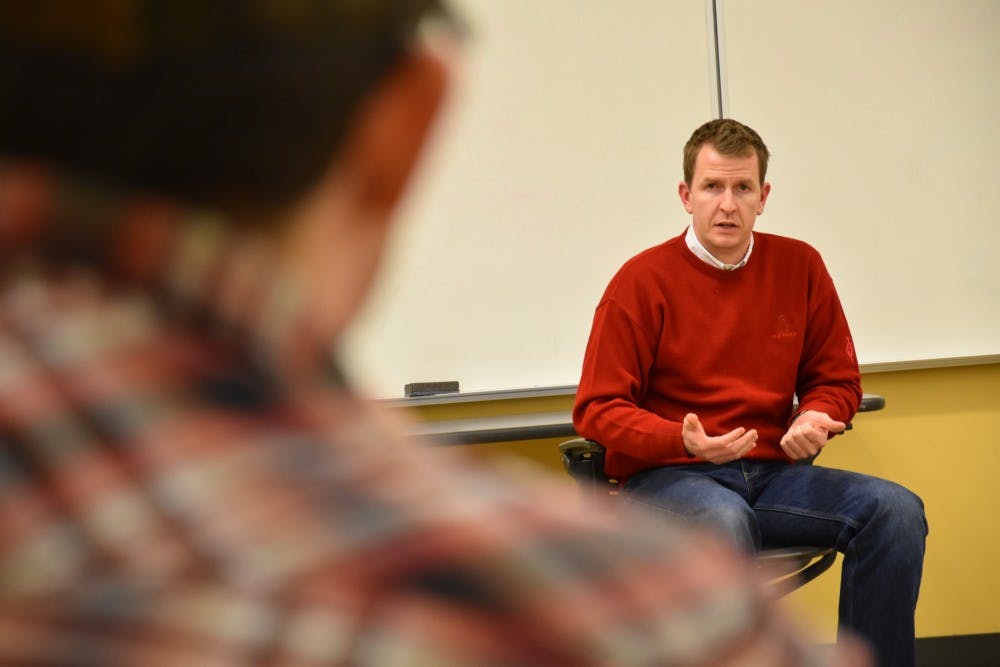You can learn more about PolitcalBank here.
The founder of a non-partisan political company and a former policy coordinator for former Gov. Mike Pence visited Ball State to share his experience with the Ball State College Republicans Feb. 9.
Adam Berry, co-founder of PoliticalBank, worked with the former governor during his campaign in the gubernatorial race, starting out as a policy coordinator.
His job entailed managing 50 volunteers that would come up with policy ideas, and he would then filter the ideas down and present them to the candidate. When Pence became governor in 2013, Berry continued to work for him as a regulatory policy director and as a member of the governor’s special counsel.
"For example, my main policy paper was the moratorium on new regulations, which is what's similar to what Trump signed,” Berry said. “I guarantee that was influenced by Pence."
Berry said the work he did while Pence was governor was similar to his work on the campaign trail, with 85 percent of his work focusing on policy and 15 percent focusing on the "legal side" of things.
Berry said he would see what policies could be pushed forward through regulation, executive orders or legislation and built coalitions of support through legislators in the general assembly or interest groups.
"It's all about playing chess,” he said. “You had to be five steps ahead to get the policy through."
Berry described the former governor as one of the "most genuine" people he has ever met.
“[He is] very genuine, very deliberate about what he does. His decisions again, very much faith-based," Berry said. "You might disagree with him but there is no question where he stands."
Berry said he would regularly go to the governor’s mansion to brief him on policy and would see the former governor in a way you would see a "normal citizen."
“He would be in his jeans that had to be 20 years old, his boots would be sitting next to him and he'd be in some old socks, you know, and worn-out shirt,” Berry said. “Very much just a regular guy."
The former regulatory policy director was working for the governor when the Religious Freedom Restoration Act (RFRA) was signed into law — and the was there for the backlash that came along with it.
Companies and conventions threatened to leave the state after the bill was signed into law and some cities even initiated travel bans to Indiana.
"[Pence] was personally affected by it,” he said.
In Berry’s view, there was a disconnect with what was being said about the intent of the bill and what the actual bill consisted of.
“The governor was regularly mentioned when talking about 2016 presidential candidates,” he said. “After RFRA, which was picked up by international news organizations, he was no longer part of the list of potential presidential candidates."
Berry said he believes Trump picked Pence as his vice president because of his “character and strong reputation as being a conservative leader" and his time spent in the U.S. House of Representatives.
“When you look at Trump’s inner circle in the White House, nobody has federal government experience,” Berry said. “So the vice president, whether he wants to or not, he is going to be a confidant of President Trump just because he has such an institutional knowledge of D.C."
Berry said his time working on political campaigns and government has helped him work toward his next venture.
PoliticalBank, a startup based out of Indianapolis, is a website that helps candidates get traction in political contests and helps voters find out where candidates stand on issues.
"I have two other co-founders,” Berry said. “I'm the Republican in the relationship and they're the Democrats in the relationship."
He believes candidates need three things in order to be elected: money, a website and votes.
"You never eat at a restaurant that doesn't have a website right? I say the same thing for the future of politics. How can you vote for someone that doesn't even have a website?" he said.
Berry said his company’s goal is to “make it stupid simple” for candidates to launch an effective campaign and to give voters an easy way to learn about candidates in local, state and national elections.
"A third of my life has been spent in politics. It's just been through my experience and seeing the struggles candidates have when running for office, especially challenger candidates, to get their name out there build their name ID, to raise money," Berry said. "It's kind of like the old cliché there has got to be an easier way."
Berry told the Daily News that candidates running for office will be able to order yard signs, shirts, hats and other merchandise directly through their website before the end of this quarter.
The entrepreneur believes his company is positioned to be the “dominant political marketplace” and hopes his company can help service “a lot of underserved candidates” in the United States.
Members of the Ball State Republicans enjoyed hearing about Berry’s experience in politics and business as well as discussing politics today.
Andrew Hammer, a junior economics major and the chairman of the club, said he was fascinated by Berry’s background in politics and how he is transferring it to business.
“[He is] kind of changing up the game of what he’s doing with politics,” Hammer said. “I definitely think politics and business go hand in hand because one has an impact on the other, obviously.”
Sabrina Kilgore, a freshman speech and language pathology major and the public relations chairwoman for the Ball State College Republicans, said she also enjoyed the discussion about the Republican Party.
“I especially loved the part where we were kind of defining what it means to open the tent and being inclusive,” Kilgore said.
She said the discussion challenged her in a way and it reflects what the Ball State College Republicans is doing.
"Our group is already incredibly inclusive and it’s a very relevant question for us,” Kilgore said. “Nobody in the group totally agrees on one thing or totally agrees other so it’s something we see every single week here in group.”





